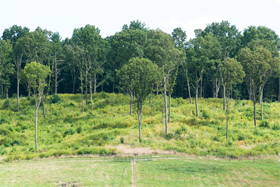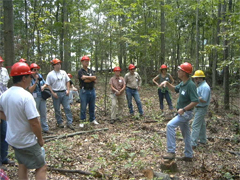Forestry Research

Most farms in Virginia contain woodlots or substantial forested acreage. Although most Virginia farmers are excellent managers of their crops and livestock, many fail to properly manage their forestry resources and as a result, do not fully reap the economic potential of those resources. On-going projects at the Shenandoah Valley AREC are examining how producers can properly manage their forestry resources in a sustainable manner and at the same time generate additional revenue to the farming operation. Projects include:
- Regeneration of oak forests on high quality limestone derived sites - Downing.
- Economic feasibility of long-term timber management for private forest landowners - Downing.
- Alternative income opportunities for forest landowners, including shiitake mushrooms, charcoal, value-added lumber production, and botanical herbs - Downing.
- Silvopasture establishment via forest thinning and field planting, tree performance and forest product marketing - Downing.

- Many working farms in Virginia include potentially productive forests, but regularly fail to take advantage of the associated opportunities. A LEAF (Link to Education about Forestry) classroom at the Center will communicate the benefits of farm and forest management. About 232 of the Center’s 364 hectares are dedicated to beef production and forage research. By combining livestock activities with sustainable forestry in the remaining 132 hectares, we will demonstrate how farms can enhance revenue and environmental quality using forest management (Munsel, Yancey).
Forestry Fact Sheets




